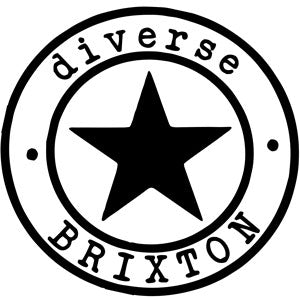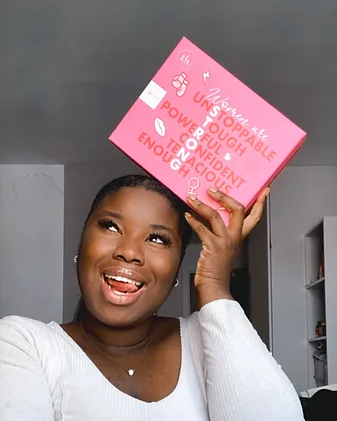Designer, BijouCREATES
My name is Bijou Harding. I am the founder of BijouCREATES. I'm an emerging architect and a designer with a passion for creating.
My family and I originate from Freetown, the capital of Sierra Leone, and we're based in the UK.
I did my undergraduate studies at University College London (UCL), then I did my master's degree at Cambridge. Both degrees are in Architecture. Currently, I'm completing the final stages to become a qualified architect, while developing BijouCREATES.
What is BijouCREATES?
BijouCREATES is a design company that blends West African traditional craft and design techniques with a 21st century western lifestyle aesthetic - a kind of contemporary design hybrid.
BijouCREATES has developed a range of products that incorporate West African textiles into modern accessories that can be worn with contemporary fashion. We design and produce statement handbags, device cases, toiletry bags, and more.

After finishing my degree in Architecture at UCL in 2020, my plan had been to work in a London architectural practice, and then complete my master’s degree at Cambridge. I achieved what I'd set out to do but I found working in an architectural practice not as fulfilling as I thought it would be. Also, working in a high-pressure office and commuting from Surrey to London was exhausting!
For as long as I can remember, I’ve loved designing, creating and making - and architecture was, in part, a great outlet for that; but after spending a year working on major building projects, I found the desire to develop my own design ideas and creative aspirations too great to ignore.
What were your first products?
I started initially sewing and making one-off items. My first BijouCREATES product was a laptop case using African kente cloth. I then moved on to using ankara prints as accents on other accessories. These fabrics have always been a part of my life, having seen them worn in my family as occasionwear, and also as a symbol of pride. I wanted to use them in a different context, on things that are practical, and also bring them to a wider market.

My initial products sold well among my networks so I set up a website to showcase my ideas to the world. I have since been developing BijouCREATES to create a range that is uniquely my own. My products are now stocked in several shops, including Diverse.

One of the things we’ve noticed about your collection is a move towards more traditional African textiles - hand-dyed fabrics, in particular. Why the shift?
Yes, my initial products used mainly mass-produced ‘ankara’ or Dutch wax prints that are synonymous with West African style and fashion. However, your readers might be surprised to know that these prints didn't, in fact, originate in Africa. The wax prints that are so popular today were brought to West Africa in the mid-19th century by the Dutch after their attempt to copy and mass-produce traditional Indonesian batik fabric failed to find a market in Indonesia, which was then one of their colonies. They did, however, find a market in West Africa - but often at the expense of the indigenous textile industry.
Once I learned this, I started to think about my role in this dynamic and what part I could play in helping to keep the traditional textile crafts of my heritage alive. I studied the technique of hand-dyeing fabric more closely during my master’s project, and learned more about Gara fabric which is native to Sierra Leone. I then started to incorporate Gara - a local fabric using traditional hand-dyeing techniques - into my work.

Tell us about ‘Gara’.
Gara is a traditional way of hand-dyeing cloth. It is named after the gara leaf that is harvested to produce a natural dye. The dyeing process involves folding and binding the fabric to resist the dyes, resulting in beautiful, intricately-patterned fabric. Each batch of Gara fabric is completely unique because of the intuitive, hand-dyed nature of the process.
Tell us more about your research trip to Sierra Leone and how you worked with the people there.
I’ve been fortunate to travel back to Sierra Leone with my family quite frequently. However, my trip at the end of 2021 was significant as it was part of my academic studies at Cambridge. During this visit, I was able to fully research the Gara dyeing process. I was also able to work alongside local artisans in Freetown and surrounding rural towns, such as Makeni. In fact, they produced the fabric for my latest collection of toiletry bags called, The Gara Collection.

Alongside this, I also explored how disabled people in Sierra Leone use low-cost traditional crafts as a method of self-employment to support themselves. I spent some time on placement with disability groups such as the Christian Union for the Blind and Visually Impaired, who do traditional soapmaking, and the Women with Polio Foundation who do Gara dyeing as their main trading activity.
What would you say has been the best thing about setting up BijouCREATES?
Developing BijouCREATES has been an amazing and somewhat unexpected journey. I think probably the best thing about starting my business is seeing how, with hard work and determination, something can grow from being the seed of an idea into something much bigger. I feel so much pride when I see people using my products, or when I see them in stores. It’s like a small part of me is living outside of myself in the world!

What's been your biggest challenge or learning so far?
Definitely a challenge for me has been getting to grips with the business side of things. I see myself as first and foremost a designer, but there are so many different hats and skills I’ve quickly had to learn to wear to keep BijouCREATES running. Overseeing and balancing the logistics of everything is not easy! But there are so many books and online resources that you can easily get access to, to help you. I’ve also been able to reach out to more experienced people for help with any gaps in my knowledge.
So, what’s next for BijouCREATES?
There’s so much in store for BijouCREATES. I’m always working on new collections and product designs, which is my favourite thing to do.
The biggest thing though is moving our production to Freetown in Sierra Leone. I made so many great connections while working with the charities and artisans there. We're currently collaborating with the Women with Polio Foundation to produce fabric for the Gara Collection, and we’re working with local tailors in the city to make the bags. It’s been great to be able to give back to the country of my heritage, and it’s something I’m personally very proud of. I believe the future is bright for my young brand and I’m excited for what we’ll achieve next. Watch this space!


